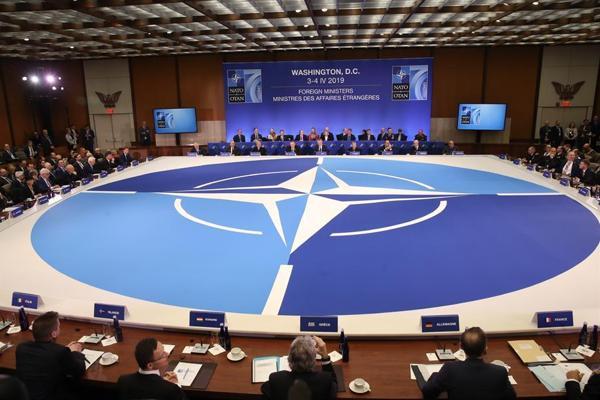NATO plans for Russian 'aggression' on 70th anniversary
WASHINGTON- Agence France-Presse


NATO said on April 4 it was taking new action to counter Russia's "aggression," finding a united message amid other differences within the Western alliance on its 70th anniversary.
Closing two days of talks in Washington, foreign ministers from the 29-nation alliance said in a joint statement that they face "an unpredictable and challenging security situation" that includes "a more aggressive Russia."
NATO Secretary General Jens Stoltenberg said the alliance approved new surveillance measures and naval exercises in the Black Sea to back Ukraine and Georgia, aspiring members of NATO that are facing Russian-backed separatist forces.
Stoltenberg urged Russia to return three Ukrainian navy vessels and its sailors which it seized in November near Crimea- the peninsula that Moscow annexed in 2014, in a move not recognized internationally.
"We are stepping up our efforts in the Black Sea region," Stoltenberg told reporters.
U.S. Secretary of State Mike Pompeo said that NATO members agreed to study strategies to face non-traditional warfare from Russia, which is accused of meddling in a series of Western elections.
"Vladimir Putin harbors dark dreams of imperialism. This is evident from his invasions of Georgia and Ukraine, his meddling in Syria and now in Venezuela. He wants to split our alliance and weaken our democratic resolve," Pompeo said.
Russian President Vladimir Putin counters that NATO has posed a threat by its eastward expansion into the former Soviet bloc and accuses the United States of plotting a coup with its bid to oust Venezuela's leftist leader Nicolas Maduro.
Russia criticized the Black Sea plan and, in a statement for the NATO anniversary, voiced regret that the alliance "has no intention to renounce its political and military confrontation with Russia."
"It is time to stop bringing back the 'Eastern threat.' In the interest of peace, the world needs a de-escalation of military and political tensions," the foreign ministry said.
Stoltenberg, asked by a reporter if NATO was provoking Russia by considering membership for Ukraine and Georgia, said that "big powers" cannot dictate terms to others.
"As soon as you accept that that's a provocation against Russia, then you accept that Russia has the right to decide what neighbors can do," he said.
